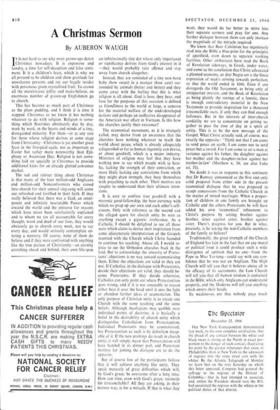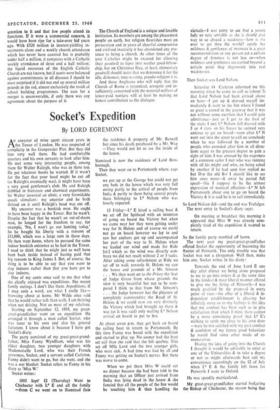A Christmas Sermon
By AUBERON WAUGH
Iis not hard to see why most grown-ups detest 'Christmas nowadays. It is expensive and tawdry, a time for self-deception and false senti- ment. It is a children's feast, which is why we all pretend to be children and show gratitude for unwelcome presents and rot our fragile insides with poisonous green crystallised fruit. To crown all the meretricious jollity and make-believe, an enormous number of grown-up Englishmen go to church.
This has become as much part of Christmas as the plum pudding, and I think it is time it stopped. Christmas as we know it has nothing whatever to do with religion. Religion is some- thing which flourishes obstinately day by day, week by week, in the hearts and minds of a tiny, disregarded minority. For them—or at any rate for those whose religion derives at some stage from Christianity—Christmas is yet another great feast in the liturgical cycle, not as important as Easter but rather more noteworthy than Epi- phany or Ascension Day. Religion is not some- thing laid on specially at Christmas to provide additional kicks for an already glutted consumer market.
The sad and sinister thing about Christmas is that many of the four million-odd Anglicans and million-odd Nonconformists who crowd into church for their annual sing-song will come out refreshed and fortified in their faith. If they really believed that there was a God, an omni- potent and infinitely inscrutable Power which created the world and the universe for reasons which have never been satisfactorily explained and to whom we are all accountable for every thought, word and deed of our lives, they would obviously go to church every week, not to say every day, and would seriously contemplate en- tering a nunnery. Of course, none of them do believe and if they were confronted with anything like the true picture of Christianity—an eternity stretching ahead and behind, their own life-span an infinitesimally tiny dot whose only importance or significance derives from God's interest in it —they would probably take offence and stay away from church altogether.
Instead, they are reminded of a tiny new-born baby (how sweet) in a manger (how cute) sur- rounded by animals (better and better) and they come away with the feeling that this is what religion is all about. God is love, they hear, and love for the purposes of this occasion is defined as friendliness to the world at large, a concern for the material welfare of the underdeveloped nations and perhaps an ineffective disapproval of the American war effort in Vietnam. Is this how the churches justify their existence?
The ecumenical movement, as it is strangely called, may derive from an awareness that the churches have nothing whatever to teach the world about peace, which is already adequately safeguarded so far as human ingenuity can devise, or about goodwill, which is a major industry. Ministers of religion may feel that they have nothing new to say which people wish to hear. So, lacking the strength of their conviction, or more likely lacking any convictions from which they might draw strength, they busy themselves with preaching to each other. Their motives are simpler to understand than their ultimate inten- tions.
It is easy to confuse true goodwill with a moronic good-fellowship, the base currency with which we prop up our own and each other's self- esteem. Only with reference to the second can the alleged quest for church unity be seen as anything except a gigantic irrelevance. As a Catholic, I should be delighted to see all those sects which claim to derive their inspiration from some idiosyncratic interpretation of the Gospels reunited with the Church which Christ founded to continue his teaching. Above all, I would re- joice to see the Orthodox churches back in the fold. But to acknowledge the sincerity of Protes- tants' objections is no way toward ecumenicising them. Either the objections are valid or they are not. If Catholics, in the dialogue with Protestants, decide their objections are valid, they should be- come Protestants. If they decide otherwise, Catholics can only point out where Protestantism goes wrong, and if it is not amenable to reason either beat it over the head until it secs the light or abandon further ideas of ecumenicism. The only purpose of Christian unity is to create one Church with the same teaching and the same beliefs. Although theologians may quibble over individual points of doctrine, it is basically a belief in the desirability of church unity which distinguishes Catholicism from Protestantism. Individual Protestants may be ecumenicised, but Protestantism as such is by definition incap- able of it. If the new probings do result in church unity, it will simply mean that Protestantism will have handed in its dinner pail, and Protestant motives for joining the dialoeue are to do the opposite.
But of course few of the participants believe that it will achieve anything like unity. They speak maturely of great difficulties which will, by God's grace, be overcome after a long time. How can time, even with God's grace, reconcile the irreconcilable? All they are asking, in their mature way, is for a miracle. If that is what they want, they would do far better to retire into their separate corners and pray for one. Any further dialogue between them can only increase the magnitude of the miracle required.
We know that Boer Calvinism has ingeniously read into the Bible a blue-print for the principles of apartheid, even down to separate washing facilities. Other enthusiasts have read the Book of Revelation sideways, in Greek, under water, and come to the conclusion that Christ advocated a planned economy, or that Negro art is the finest expression of man's striving towards perfection, or that the world ended in 1666. Even if one disregards the Old Testament, as being only of antiquarian interest, and the Book of Revelation as being plainly the ravings of a lunatic, there is enough contradictory material in the New Testament to provide inspiration for a thousand irreconcilable sects, if only they can find enough followers. But in the interests of inter-church cordiality we are to concentrate on getting to- gether to pass the time of day in a spirit of amity. This is to be the new message of the Gospel. What Christ actually said, of course, was exactly the opposite: "Think not that I am come to send peace on earth; I am come not to send peace but a sword. For I am come to set a man at variance against his father, the daughter against her mother and the daughter-in-law against her mother-in-law' (Matthew x, 34; see also Luke xii, 51).
No doubt it was in response to this sentiment that Dr Ramsey announced as the first and only solid proposal from either side in the present ecumenical dialogue that he was prepared to accept concessions from the Catholic Church in the matter of mixed marriages. When a propor- tion of children in one family are brought up Catholic and the others Protestants he will have added his own 'ecumenical' refinement to Christ's purpose by setting brother against brother, sister against sister, brother against sister. There's progress for you. But in what, precisely, is he asking the non-Catholic members of the family to believe?
Traditionally, the great strength of the Church of England has lain in the fact that on any moral or political issue it could produce such a wide divergence of opinion that no one—from the Pope to Mao Tse-tung—could say with any con- fidence that he was not an Anglican. The High Church will tell you that it believes above all in the efficacy of its sacraments, the Low Church will tell you that all human wisdom is contained in the Bible, which only Anglicans can understand properly, and the Moderns will tell you anything which enters their heads.
Its weaknesses are that nobody pays much
attention to it and that few people attend its functions. If it were a commercial concern, it would have been ripe for a take-over bid years ago. With £320 million in interest-yielding in- vestments alone and a weekly church attendance which has never been counted but is probably under half a million, it compares with a Catholic weekly attendance of three and a half million; the liquid resources of the English Catholic Church are not known, but if assets were balanced against commitments in all dioceses I should be most surprised if it did not end up several million pounds in the red, almost exclusively the result of school building programmes. The case for a merger is unanswerable, if only there was any agreement about the purpose of it. The Church of England is a unique and lovable institution. Its members are among the pleasantest people on earth, but religion flourishes most on persecution and in years of cheerful compromise and civilised inactivity it has abandoned any pre- tence to being a church. At other times of the year Catholics might be excused for allowing their goodwill to lapse into secular good-fellow- ship, but on Christmas Day, at least, elementary goodwill should insist that we denounce it for the idle, dishonest, time-wasting, pseudo-religion it is.
And those Anglicans who will reply that the Church of Rome is tyrannical, arrogant and in- sufficiently concerned with the material welfare of lower-paid workers will at least be making an honest contribution to the dialogue.































 Previous page
Previous page